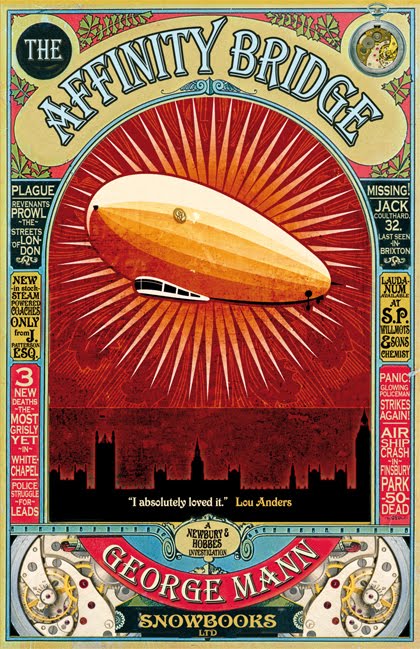I confess in advance that this review may be a little vague—I listened to George Mann’s The Affinity Bridge about a month ago and have since read The Eyre Affair.
The Affinity Bridge is a steampunk book. It is so steampunk, in fact, that it’s as if the author had a little checklist of ‘steampunk things’ beside them as they wrote it, and diligently made sure to tick every single box before the end. But I get ahead of myself.
As you may have already predicted, the story is set in Victorian London. The scene opens with a series of seemingly supernatural murders by a luminescent policeman, which are shortly followed by a mysterious airship crash. There’s also a disease that essentially turns people into nocturnal zombies, which is mentioned frequently so that you don’t forget about it (because it’s important later on).
 Our protagonists are Sir Morris Newbury—anthropologist at the British Museum, dabbles in the occult, handsome and charming but unattached—and his assistant, Miss Veronica Hobbs, a forward-thinking young woman who’s not afraid to kick a door down and stand in the ashes of a hundred burnt corpses, yet is curiously also unattached.
Our protagonists are Sir Morris Newbury—anthropologist at the British Museum, dabbles in the occult, handsome and charming but unattached—and his assistant, Miss Veronica Hobbs, a forward-thinking young woman who’s not afraid to kick a door down and stand in the ashes of a hundred burnt corpses, yet is curiously also unattached.
The dynamic duo investigate the strange goings on and, in a shocking turn of events, find the cases to be linked. I suspect you can imagine how things pan out, to be honest. Also in the plot are crazy French scientists, a fight on top of a moving train, random steampunk gadgets, a fight with zombies in the fogs of Whitechapel, remarkably functional automatons, a fight involving priceless artifacts at the British Museum, steampunk-cyborg Queen Victoria, and another fight in a crashing airship.
It’s not a challenging read (or indeed a challenging listen, but more on that in a moment), but it is rather enjoyable—the plot is fairly well paced, and though it’s clear who’s guilty from very early on, I was still keen to continue the story. I did have some niggles, though.
My major problem was the info-dumping. It was so conspicuous and ham-fisted that it actually distracted me from the story and left me to marvel at it. Worse than that, the same info-dump was repeated more than once. For example, Sir Morris tells another gentleman about the history behind an apparent ghost. This explanation takes a while, but it’s tolerable. Sir Morris then meets up with Veronica and tells her exactly the same thing in almost the same words. Why?! Why not just write “so Sir Morris told her what he’d told Bainbridge”? Why do I have to hear this again? And why does this happen more than once in the book? I was perplexed, and felt that an editor somewhere really should have noticed it. It was particularly obtrusive in audio format, too.
My next problem was the characters. Alright, so the elements and features of the story are predictable, I can live with that, but I wanted more from the main characters. Of course Veronica and Sir Morris are going to rapidly develop an awkward, unacknowledged attraction. Of course Sir Morris has a secret laudanum habit. Of course Veronica has a sister who can see the future in an unhelpful manner.
Yet these trappings do not substantial characters make. It’s frustrating, because I liked the characters—I just wanted them to be more, to break out of their shells just a little, to be better than predictable stereotypes. Maybe I’m expecting too much from such a formulaic book, but the point stands. I’m hoping that they flesh out a bit more in the sequels (of which I think there are a couple); I yearn for character development.
My final problem lies in the audiobook itself, so feel free to skip this paragraph if you’re not interested. My copy is the one off Audible, and I imagine the only audio version of the book. It is also of pretty average production. The narrator is acceptable, though they didn’t differentiate between some characters very well, which occasionally left me wondering who was speaking. What really wracked me off, though, was that the narrator would occasionally fluff a line, clear their throat or suchlike, and then read the line again. Did nobody at the production company listen to this all the way through before shipping it out? It happens a few times and in my opinion is pretty damn shoddy when it would be the work of a few minutes to cut out such mistakes.
In conclusion, despite my gripes, I did enjoy The Affinity Bridge*, and will likely give its sequels a try. It may be checklist-steampunk, but it’s quite fun nonetheless. Perhaps the Hello! of steampunk literature, I’d recommend it if you want the genre without anything too challenging or new.
*(Though the ‘Affinity Bridge’ itself is not even mentioned until the book’s climax, and then only once.)